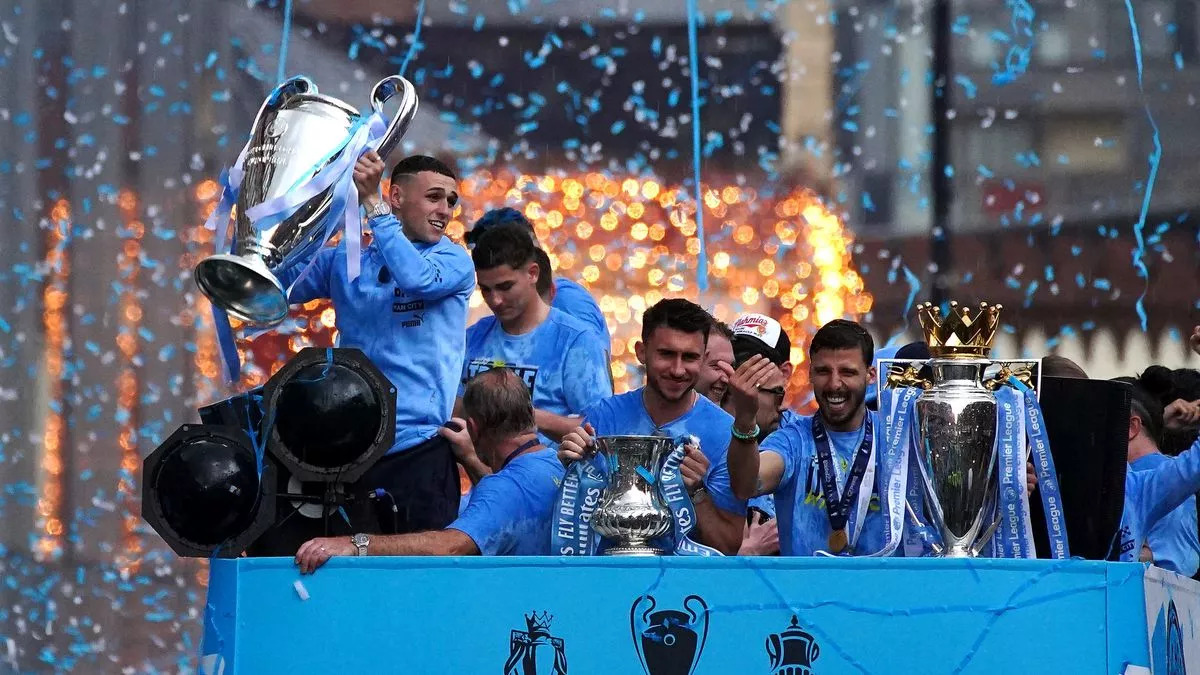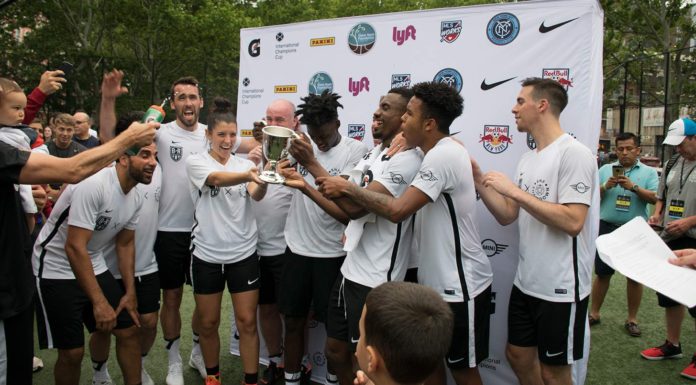Manchester City’s UEFA Champions League triumph over the weekend put the club in rarified air — it’s only the eighth time a men’s European club has won a domestic league, domestic cup, and continental cup in the same season. We compare City’s historic season to the seven other previous European treble winners.
Monaco away, the VAR fiasco against Spurs, Raheem Sterling’s miss against Lyon, the heartbreak in Porto, and the capitulation in Madrid. Manchester City are no strangers to devastating results in Europe. But all of that pain was cathartically released for City and their fans after the grueling 1-0 victory over Inter Milan to secure that elusive UEFA Champions League trophy.
However, the club’s first UCL is no ordinary title. This victory sealed one of club football’s most difficult achievements: a continental treble. Eight men’s teams have done it in Europe, and only five since the European Cup became the Champions League. City became the second English team to achieve the continental treble, joining local rivals Manchester United, who accomplished it in the 1998-99 season.

This treble symbolizes what the City ownership group set out to do when they bought the club in 2008 — to make it the best team in Europe. While several media members and fans have said that about City, they never had the trophy to justify it. Now they do and it might just be the beginning.
While City have several off the field issues that might lead to the questioning of the credibility of this accomplishment, let’s focus on what this triumph means and how it compares to other treble winners.
The Dominance
When looking back at previous treble winners, it’s interesting to see how dominant they were in each of the competitions they won. The Bayern treble-winning teams in 2012-13 and 2019-20 are prime examples of pure dominance.
For their first treble, Bayern won the Bundesliga by 25 points over second place Borussia Dortmund, who they wound up meeting in the UCL final as well. In the Champions League, the dominant moment was the semifinal against Barcelona. They won 7-0 on aggregate, and it was the defining moment of their season. In 2019-20, the Bayern domination was similar, especially in the UCL where they won every single game, albeit there was only one leg for the quarters, semis, and the final due to the COVID-19 pandemic.
While Manchester United were not “dominant” in their treble, they showcased the most important trait in a treble winner. Resiliency. The United team was very difficult to beat, and they showcased it in the Champions League knockout stages with their comebacks and refusal to lose.
Manchester City were not dominant in the first half of the season, but a second-half surge that saw just one loss in the final 28 matches across all competitions turned things around in a hurry. The one loss was also in a more or less meaningless final EPL match of the season that occurred after City had the title wrapped up.
They were dominant in all facets of the game in the second half. They scored at an incredible rate with the finishing of Erling Haaland and the creativity of Kevin De Bruyne. They were even more dominant defensively where they suffocated opponents, and a key reason was a tactical switch by Pep Guardiola. They had four center backs in defense, and they shut down teams with ease.
City will not go down as the most dominant treble team, but they are still one of the strongest club sides we’ve seen in recent years. The Pep era of City belongs in the upper echelons of football dominance.
The Magic
With the treble comes magic and almost destiny-like moments. No treble winner symbolized that more than Manchester United. The Solskjaer winner against Bayern in the final, or the Ryan Giggs solo winner in the FA Cup semifinal against Arsenal are just two moments that will live on forever.
Inter had the UCL semifinal against Barcelona, and the famous Jose Mourinho antics after the whistle. For Barcelona’s 2008-09 team, there was Andres Iniesta’s goal at the bridge or the iconic Lionel Messi header against United in the final with him holding his shoe after the goal.
City had these moments like the other teams before them. The Ilkay Gundogan brace in the FA Cup final when he scored 13 seconds into the game felt like City were reaching their destiny. Just in the UCL final alone, they had a few moments with some horrific misses by Inter. Before that, there was the strike from De Bruyne at the Bernabeu to get that important draw against Madrid in the semis.
Whilst City’s magical moments from this campaign may not be remembered as much as others, they, like every other treble team before them had their share. And in the eyes and hearts of every Manchester City fan, those will last a lifetime.
Looking Ahead
The timing of City’s treble is very similar to many of the treble winners before them bar Inter Milan. The Italian side’s treble came at a time when most of their squad was older and it was a last hoorah of sorts with the likes of Diego Milito, Walter Samuel, Javier Zanetti, and Samuel Eto’o, among others. The other trebles felt like this was just the beginning of dominance. Similar to Manchester United when they won the treble, City had achieved great domestic success until getting that elusive UCL.
For some, they might feel like this is the peak for the Pep era at Manchester City, as key players are leaving such as Gundogan and Bernardo Silva, and Pep’s future is only tied for two more years. However, when you look at players like Haaland and Phil Foden who are still very young and have more levels to hit, alongside the likes of Ruben and John Stones, City are far from being done.
The difference between this City treble win and others is the competition around them. While it will be difficult, City have a solid chance of another treble within the next two years again. None of the other treble winners bar Barcelona were able to create a dynasty in all competitions, and City have a good chance to join them.








